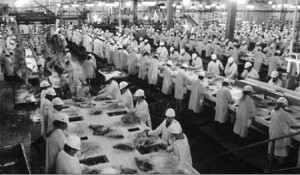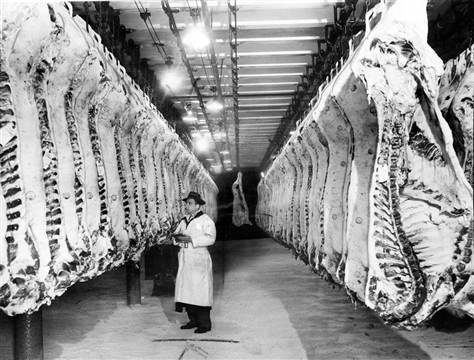 CONSTITUTIONAL RIGHTS FOUNDATION Bill of Rights in Action FALL 2008 (Volume 24, No.
CONSTITUTIONAL RIGHTS FOUNDATION Bill of Rights in Action FALL 2008 (Volume 24, No.
 Upton Sinclair, an American journalist and writer, released a book entitled The Jungle in 1906.
Upton Sinclair, an American journalist and writer, released a book entitled The Jungle in 1906.
 The Jungle is a 1906 novel by the American journalist and novelist Upton Sinclair (1878–1968).
The Jungle is a 1906 novel by the American journalist and novelist Upton Sinclair (1878–1968).
"The Jungle," a 1906 novel by Upton Sinclair, is full of graphic descriptions of the poor conditions workers and cattle endured in the Chicago meat-packing industry. stygian dark or gloomy. Upton Sinclair's "The Jungle" In 1906, a book was published that remains controversial in some circles more than one hundred years later. is it really like this? 1) Reform Communism, Capitalism, and Democracy in China , Upton Sinclair wrote The Jungle to expose the appalling working conditions in the meat-packing industry. Upton Sinclair THE JUNGLE Grosset & Dunlap Early Reprint Hardcover Green Boards. Thanks to Sinclair's hard work, we no longer have to eat sausage that includes bits of meat scraped from the drainage hole in the factory floor (we hope). To Upton Sinclair ! The jungle by upton sinclair sounds like a intresting book. CONDITIONS IN MEATPACKING PLANTS (1906, by Upton Sinclair)The explosive growth of American industry in the late nineteenth century caused a similar expansion in the work force. Quote 2: "It is a sound, a sound made up of ten thousand little sounds. Glossary. also, does it everrr talk about how the slaughter the animals or animals getting hurt? Upton Sinclair Hits His Readers in the Stomach. "The Jungle" by Upton Sinclair was a journalist's fictionalized account of worker conditions in the meatpacking industry and slums of Chicago. Explanation of the famous quotes in The Jungle, including all important speeches, comments, quotations, and monologues. In the original serial form of The Jungle, Jurgis is arrested on election night; however, this ending does not emphasize a socialist triumph, and Sinclair changed the ending when The Jungle was published in book form. It was the result of his muckraking journalism on the horrifying treatment of poor, immigrant workers in the United States, however it is best remembered today for being the catalyst of today's food standards. His description of diseased, rotten, and contaminated meat shocked the public and led to new federal food safety laws. The book describes, in great detail, the horrid working and living conditions of immigrants in America around the turn of the century. Chapter 7 The Jungle Upton Sinclair No preview available - 1906. Filed under Uncategorized. Shipped with USPS Media Mail. i hate it when books make me cry. In 1904, in the midst of a bitter stockyard strike, socialist writer Upton Sinclair’s two-month visit to Chicago’s “Packingtown” area provided him with a wealth of material that he turned into his best-selling novel, The Jungle.The book is best known for revealing the unsanitary process by which animals became meat products. [1] Sinclair wrote the novel to portray the harsh conditions and exploited lives of immigrants in the United States in Chicago and similar industrialized cities. Chapter 2, pg. The Jungle is one of the greatest (and most controversial) works by Upton Sinclair..Dedicated to "the Workingmen of America," the novel detailed the unhealthy conditions of the meatpacking industry and eventually led President Theodore Roosevelt to pursue new federal legislations. so helpp me! It was the result of his muckraking journalism on the horrifying treatment of poor, immigrant workers in the United States, however it is best remembered today for being the catalyst of today's food standards.
 CONSTITUTIONAL RIGHTS FOUNDATION Bill of Rights in Action FALL 2008 (Volume 24, No.
CONSTITUTIONAL RIGHTS FOUNDATION Bill of Rights in Action FALL 2008 (Volume 24, No. Upton Sinclair, an American journalist and writer, released a book entitled The Jungle in 1906.
Upton Sinclair, an American journalist and writer, released a book entitled The Jungle in 1906. The Jungle is a 1906 novel by the American journalist and novelist Upton Sinclair (1878–1968).
The Jungle is a 1906 novel by the American journalist and novelist Upton Sinclair (1878–1968).